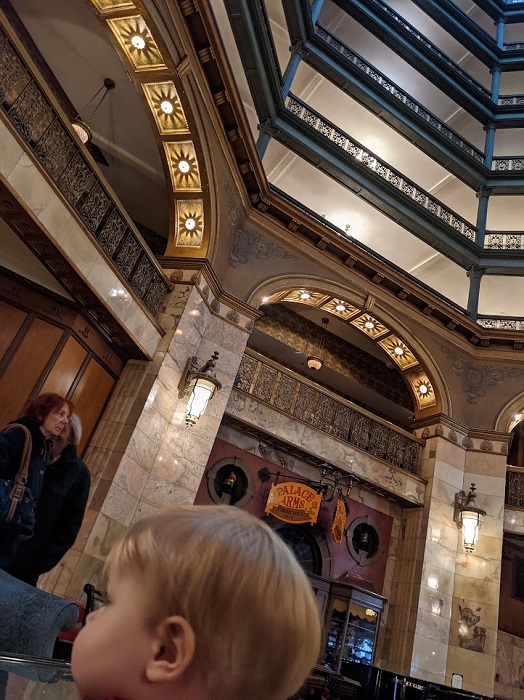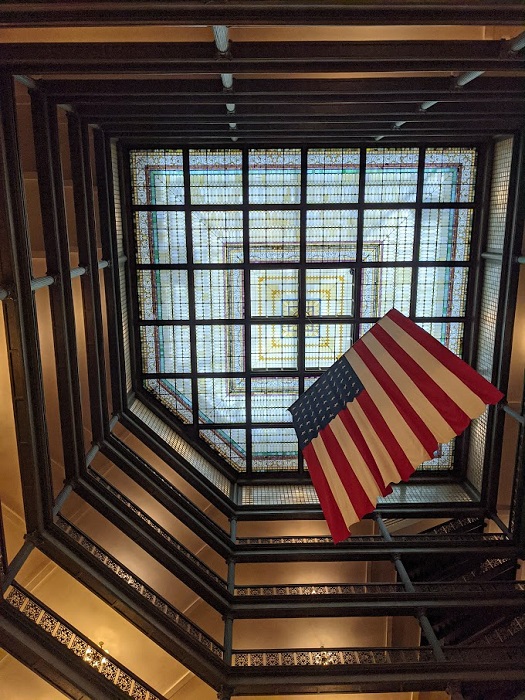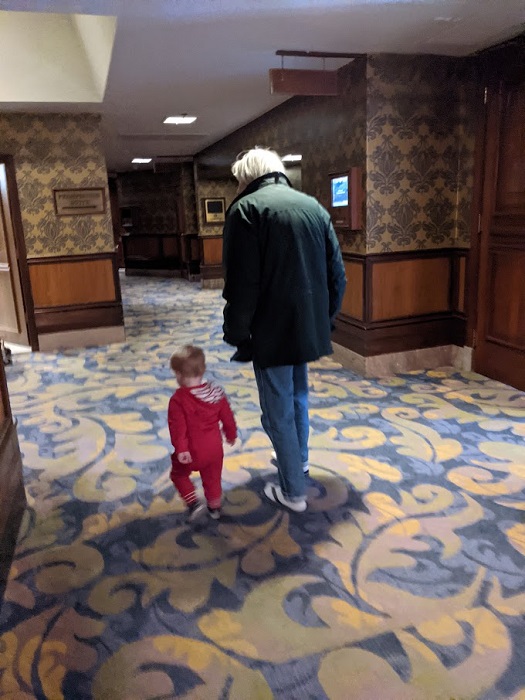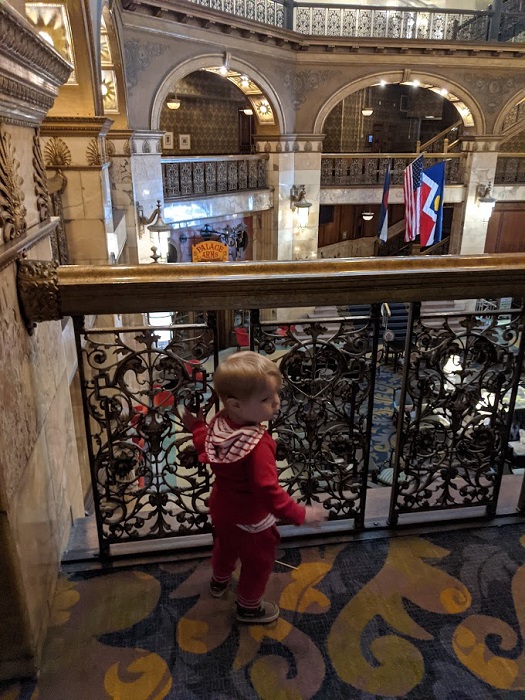Today, I took my son on an escalator and broke down. To be clear, the escalator didn’t break down. I did. We were at the Adventure Aquarium in Camden, where we’re members, and he’d just seen the hippos and done the Shark Bridge and toured the gift shop and now he wanted to ride the narrow little one-lane escalator down to the lobby and back up to the cafe, then do it again. It’s not quite a slide, but it’s a pretty fun ride.
Graham’s history with escalators began just last October, a time that feels now like it was longer ago than Graham’s been alive – at least three years, maybe four. The meme of parenting, which seems to be everywhere right now, is the days are long but the years are short. I have found this to be far from the truth. Maybe it’s a product of being a pandemic parent, of having the timeline of the pregnancy so closely trace the onset of COVID in America, but I feel like the days are long and the years are infinite. Graham’s 31 months feel like they’ve last twice as long. Let’s be clear: this is a good thing. I’m acutely aware of how fleeting childhood can be and that it doesn’t recur once it’s gone. I want to sit and savor these days, no matter how much I’m hurting now. But they in no way feel quick.
Last October, Alex had a work conference in Denver and we flew my parents up to join us. Despite the incredible proximity to Albuquerque, they’d spent little time in Denver, and it was an opportunity for them to get more time with Graham that would also enable us to work. We had dinner at the Old Spaghetti Factory, long a family favorite on my side, requiring an outlandish double-Uber out to the suburbs since the downtown one has closed. We had dinner with a former Rutgers debater and his girlfriend. We went to bookstores and train stations and old churches and ate delivery Chinese food in the lobby on ceramic plates illicitly borrowed from the breakfast buffet. It was, in short, a lovely trip, and just the kind of thing we maybe didn’t do regularly enough but would have definitely done had we known what was to come.
A particular highlight of those few days in Denver was an extended perusal of the Brown Palace Hotel, built in 1892 and probably the premier grand old hotel in the city (as is often the case, there is an extant rival, the Oxford, that is slightly older and far less spectacular). The Brown Palace was the place to stay for Denver visitors in much of the last century and is still in grand condition, the rooms no doubt remodeled around a spectacular atrium that skies nine stories toward a notched square ceiling of iron and glass. The bottom floor offers an elegant tea service and the whole building is full of the quiet corners, winding passages, ancient eateries, and detailed nuances that make old hotels so enchanting.


Going around to old hotels was one of our favorite travel habits from my youth. Occasionally, we stayed in them, the product of my father’s faith in and facility for getting a great last-minute deal just by asking questions and being patient. It was related to our penchant for visiting dams and bridges, but it wasn’t just about the architecture or the engineering. Old hotels have an unparalleled magic about them, something between the sheer accumulation of restful (and sleepless) nights logged there, their role in the public imagination, their ability to reinvent themselves yet never be fully knowable. Of course, the quintessential exhibit here is the La Fonda, which became a multi-decade Christmas tradition for us after moving to New Mexico, even as the new ownership slowly corroded so much of the mystery that provided the charm. And all of this plays a role in my long-running fascination with someday being a hotel night manager.
So, back at the Brown in October 2022, we explored.


And it turns out that one of the old intriguing features of the Brown Palace are some stylish old escalators. They’re quite short, but like nothing I’ve ever seen before.
Have a look (I didn’t take pictures of it at the time and this is someone else’s YouTube video):
Turns out this was Graham’s first time on an escalator, or at least freestanding and boarding it under his own steam. My dad was guiding him at the time and it slipped his mind that a 22-month-old might not be well versed in automated staircase navigation. At the bottom, Graham tripped and fell forward a bit, catching himself, but a bit distraught at the surprise. My father apologized bemusedly, and Graham preferred to get much more guidance when we retraced to journey up.
Not a month later, we would be on our way to England for a Thanksgiving visit to London, on an overlong early-morning layover in the Dublin airport which was largely sleepy and closed. There, we would find a wide concourse where a couple small restaurants were open upstairs, some cushioned benches were available for Alex to sleep downstairs, and the gap between these floors was spanned by twin high glass escalators, easily four times the height of those in the Brown Palace. Over the course of two hours, Graham took it upon himself to treat these as Escalator Boot Camp, initially needing me to lift him physically on to the first step and hold his hand the whole way, but after two hours being able to walk on and off by himself without assistance. The fact that what he most wanted to do after his thirty-ninth straight trip up or down the escalator was reverse course and do it again was the truly remarkable bit. Honestly, his confidence has receded some since then, as he still wanted help getting on at the Adventure Aquarium, and prefers to hold my or Alex’s hand when he’s preparing to walk off.
It was on that trip, the one to England, when I called my father on Thanksgiving and he said that he was not okay. He didn’t know what was happening and he didn’t want to spoil my trip, but something was off. It was unsettling and scary and I considered flying home early anyway. And it foreshadowed a difficult Christmas trip marked by radical change borne of an inexplicable anxiety, an anxiety later blamed on Graves’ disease but in the full view of eight months of history looking a whole lot like a suddenly fluttering heart.
I had many more wonderful calls and visits and times with my dad after that Thanksgiving call, just after Denver. But they were all marked, overshadowed in some way, by the looming wilding beast of this anxiety. And in full retrospect, there were perhaps glimmers in Denver too. But they were faint, unidentified, challenging on one notable night (their first in town), but not overpowering. Walking around the Brown Palace, that was my dad as I knew him best, in his element, looking around, pacing the halls for little discoveries among the filigreed nooks.
There is a movie that came out 16 years ago called And When Did You Last See Your Father? It’s part of a brand of cinema that I’ve long adored that can best be described as dead-dad dramas. But they aren’t all dramas, or exclusively so – my very favorite in the genre, one that shook me to the core to the point where I bought the DVD for my father one Christmas and made him watch it so I would have a tearful memory of us watching it together to have with me always, knowing the odds were that I would someday be looking at it from here and not there, knowing that I needed this for my emotional life, is About Time. There will probably be a whole other post about that one someday. Or maybe I won’t be able to get through it. But And When Did You Last See Your Father? is marginally less poignant but still lovely, in examining a slow decline of the paternal figure rather than a sudden drop.
It asks the question this way:
And when did you last see your father? Was it when they burned the coffin? Put the lid on? When he exhaled his last breath? When he sat up and said something? When he last recognized you? When he last smiled? When did you last see your father? The last time he was healthy, active? The last time he had an argument about something? Those weeks in which we tried to say goodbye were like a series of depletions. Each day I thought “he can’t get less like himself than this.” Yet each day he did. So I’ve been trying to recall the last time I actually saw him. The last time he was unmistakably… there. In the fullness of being, I don’t know… him.
It was a haunting question at the time, not knowing how the story would end. I now know, and I know that he was lucid and had his wits about him to the very end. One of the last strands of dialogue we exchanged still spoke to his ability to stay wry through even the worst of times:
“Do you think you’re having a heart attack?”
“I don’t know, I’ve never had a heart attack before!”
He had three minutes to live.
But how far back should we pick the question of when I last saw him, in the sense of the movie line? I think maybe it was in Denver, in the lobby of the Brown Palace Hotel, while the October winds swirled around the mile-high city outside, and my son fell off his first escalator and we picked him up and reassured him that he would be okay, he would get a better grasp of this strange new world around him, and he would grow to understand it a little better.
So you know what? I’m going to be crying on escalators for the foreseeable.
This is the 12th post in the One Thing series.
Last Five
#11: Pulling Hen’s Teeth
#10: Do the Extra Thing
#9: Climbing the Ladder
#8: Home Depot Away from Home
#7: It’s the Heart that Matters More
Introduction & First Four
#4: Forgive, Don’t Forget
#3: Call Your Mother
#2: In the Land of Make-Believe
#1: Wistful Wisteria
Introduction: Announcement and Rules


